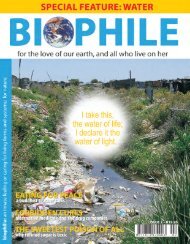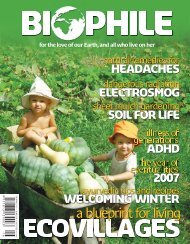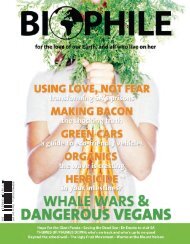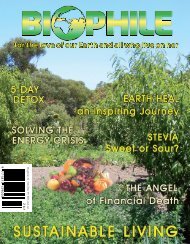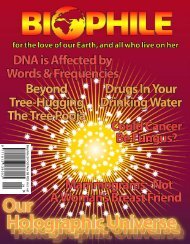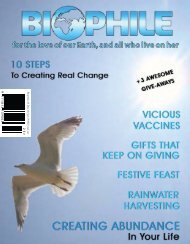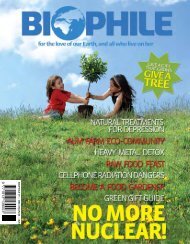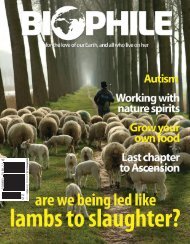B io ph ile Issu e 18 - Biophile Magazine
B io ph ile Issu e 18 - Biophile Magazine
B io ph ile Issu e 18 - Biophile Magazine
You also want an ePaper? Increase the reach of your titles
YUMPU automatically turns print PDFs into web optimized ePapers that Google loves.
Tree-free drummingI have been playing the African drum for 12years and work in the inspirat<strong>io</strong>n, healing andteam-building field now for my 7th years.Through the years it has come to my attent<strong>io</strong>nthat every one who has an African djembedrum is in actual fact playing a tree and a goat.Banging away blissfully not realising the impactthat it has on the planet.One night in a dance round the fire at a fullattended drum circle the trees spoke to meclearly, conveying the message that we have tostart using a sustainable source for the makingof drums. I spoke to the owner of the circleand suggested planting a sacred drum grove toreplace the trees cut down for the drums. Butthe idea fell on deaf ears and the message fromthe trees burned like a fire in my heart.When I spoke to one of my West Africandrum colleagues the message was confirmedand he told me that it is now illegal to cut downPlease don't lump allscientists togetherabsolutely love your magazine and can't waitI for the new issue every second month. As afemale natural scientist I take personal offenceat the abrasive comment that science is "masculineleft-brain stuff".I am certainly not masculine, have a verycreative side and believe me, you can ask mostscientists, there is no fun in measuring, recordingand dissecting. It is an essential part of anystudy so one can remain objective but the lovecomes in when patterns emerge from the resultsand answers to quest<strong>io</strong>ns become clearer.I also completely disagree that "intuit<strong>io</strong>n andfeelings" are not allowed in a "scientific and logicalsystem".Has the editor any scientific experienceon which to base such claims? There are manyscientists who are pass<strong>io</strong>nate about what theydo and play a vital role in collecting informat<strong>io</strong>non rare and endangered species to come up withconservat<strong>io</strong>n plans.One does have to remain objective when pr<strong>io</strong>ritisingspecies for conservat<strong>io</strong>n efforts, but itdoes not mean that the pass<strong>io</strong>n for conservat<strong>io</strong>nand the environment cannot exist in a scientificmind.Science (as much as it has been a contributorto many environmental problems we face today)is going to be essential in finding solut<strong>io</strong>ns tothese problems.In the same editorial, the editor ment<strong>io</strong>nsthat "there are places in Mexico where groundtemperature is heating up to an excess of 200degrees". How would we know this if it wasnot for the scientists doing what they do best? –measuring! Please don't lump all scientists intothe same category. There are many "feminine,nurturing, intuitive, right brain" scientists whoINBOX: OUR READERS WRITEtrees to make drums in Ghana because of massdeforestat<strong>io</strong>n and they are now getting the woodfrom neighbouring Nigeria. It became clear tome that something had to be done.I started experimenting with different materialsand eventually came upon the idea of usingrecycled news paper and glue to create a strongdrum shell or body which the part is originallymade from a tree trunk.It took months to perfect the formula andshape. But the hard work and dedicat<strong>io</strong>n paid offand I can now proudly say that I invented (withthe help of the trees) the first recycled paperdrum that works and sounds like a West AfricanDjembe drum. I am now using them in myworkshops and am looking for a way to turn thedrum making into a community project. To letthe drums <strong>ph</strong>ysically and spiritually bring thehealing to the rainbow nat<strong>io</strong>n and the world .Piet Aardeare unlike what you have described in youreditorial. Perhaps the editor should get to know afew and form a new opin<strong>io</strong>n.Carin SwartThank you for your pass<strong>io</strong>nate, heart-feltresponse. I totally agree with you, and maybeI did not let this come out in the editorial, thatscience has played a major role in many of theexcellent conservat<strong>io</strong>n, and other projects thatare underway. I would have been wiser to usethe word "yang" rather than masculine. It wasintended to be understood as the opposite tothe 'feminine, yin, intuitive' side of our minds. Itwas not intended as a subjective criticism ofthe males or females in the business of scientificobservat<strong>io</strong>n!I still maintain that we would need much lessscientific observat<strong>io</strong>n of all and everything, ifpeople intuited the way to live from their heartfelt response to situat<strong>io</strong>ns. This is the way theancient people do it. They have no need forany science labs. They 'talk to and listen to' theplanet, plants, animals and each other fromtheir heart centre's which are fully funct<strong>io</strong>nal.I always find it so interesting (found out byscience!) that the heart has the same cellularstructure as the brain and and it starts funct<strong>io</strong>ninglong before our brains do in the womb!In my humble opin<strong>io</strong>n this is what is sadlylacking in the teaching of our children. As thesaying goes.."what you dont use, you loose"!We live in a totally lopsided world at the moment,but I do think that people are waking upto the divinity inside of each and every one ofus. I think simple heart -centred living is key,with compass<strong>io</strong>n and considerat<strong>io</strong>n for all andeverything.AntheaWater harvestingand storage?I'm in the process ofretrofitting my own hometo be more environmentallyfriendly. A challenging taskat the best of times. A keystumbling block for me at themoment is the quest<strong>io</strong>n ofwater harvesting and waterstorage. More specifically, whatmaterial — from a life cycleand health perspective — ismost appropriate.On 50/50 I noticed that youused Jo-Jo water tanks forwater harvesting and waterstorage. Would you argue thatthese are the best containersavailable — even though theyare basically non-recyclableand directly related to thepetro-chemical industry?I've written to the CSIR andhave engaged many 'green'architects on the subjectbut cannot come up with adefinitive answer. Some havesuggested glass, but whomakes 1 000 or 5 000 litre glasscontainers? Cement is notgreat either, due to the energyintensiveness, possible healthimpacts and is also not entirelyrecyclable.I've been thinking of rows ofclay jars but they are difficultto integrate into a system i.e.inlet/outlet pipes — and alsorequire quite a lot of energy inthe baking process. But they doeventually return to the Earth.Any suggest<strong>io</strong>ns or ideason this would be muchappreciated...Harald WittI love the clay jar idea, but fear itmay be too small.The best solut<strong>io</strong>n would be tohave a well point. Saving therain water into jo-jos seems towork well I have heard, althoughI dont do that myself. I havemine collected into pipes andchannelled into a small dam atthe bottom of my property, butthere is a lot of water lost viaevaporat<strong>io</strong>n in the hot weather.I have a borehole which I usesparingly for my fruit and nuttrees and veg garden.All my grey water, black water,horse, chicken and dog manureis sent to a b<strong>io</strong> digester all mygas for my stove comes fromthe methane from this, and theeffluent is extremely nutrit<strong>io</strong>usfertiliser, and is stored in a reedbed and then pumped back tothe veg and fruit and nut — thisis a GREAT thing to have.AntheaB<strong>io</strong><strong>ph</strong><strong>ile</strong> <strong>Issu</strong>e <strong>18</strong>5



